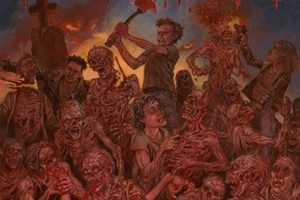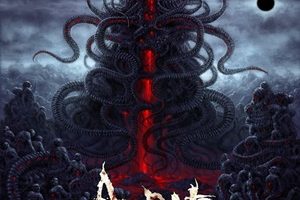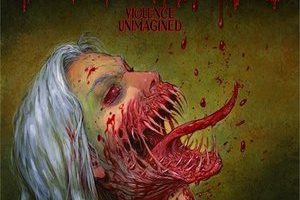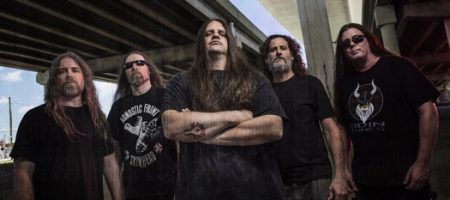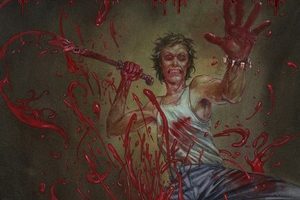Cannibal Corpse – Ageless Violence
Thursday, 1st April 2021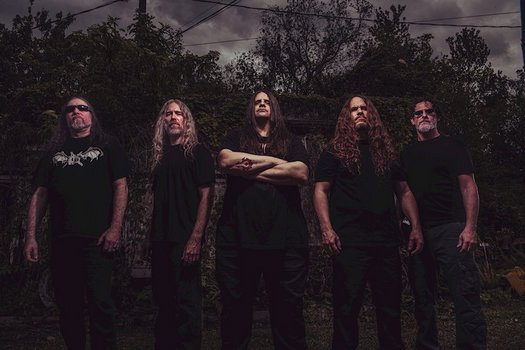
One of the foremost bands in anyone’s mind when it comes to extreme music, Cannibal Corpse are now on the cusp of their 15th album in Violence Unimagined. Joining the band on a permanent basis with this album is that of Erik Rutan (Hate Eternal), who has worked alongside them on the production end for years, as well as filling in for them on guitar since 2019. While some may expect more of the same from Cannibal at this point in the game, Violence Unimagined is impressively furious and hungry – again laying claim to the band as being one of the genre’s forefathers. We got to chat with bassist Alex Webster to get his thoughts on the new album, Rutan joining, as well as his view on the bass in metal and finding a unique sound.
Dead Rhetoric: What stands out to you about Violence Unimagined?
Alex Webster: Of course, it’s a big deal that we’ve had a line-up change since that hasn’t happened for us in a long time. Having Erik Rutan in the band has added something to our sound. Beyond that, for me, personally it was a bit different as I have never recorded in my home studio for a Cannibal Corpse album. I have done that for some of my side projects, but never for Cannibal. In that way, the process was a bit different. The whole thing wound up being a different experience – working with a different line up and a different way of doing it. But I’m very happy with the result and I think we have an album with a lot of variety that hopefully our fans will really enjoy.
Dead Rhetoric: Was it easy to welcome Erik Rutan into the band, considering the relationship the band has had with him over the years?
Webster: Definitely. We got him on to be our replacement guitar player back in 2019, and then we had him join with us as a full member in 2020. By then we had already done all of those shows with him. So we knew that relationship – him being in the band and touring with us, was working out great. It’s really like adding someone who was already part of the family. We had done so many albums with him, we were friends with him, I’ve worked with him on other musical projects in the past – it’s not like it was a situation where you are adding someone brand new and have to get to know him. We already knew him so well that it seemed very natural.
Dead Rhetoric: I know he did some writing as well. What impact do you feel he has had on the songwriting for Violence Unimagined?
Webster: He wrote three songs, and the lyrics for those songs as well. So he obviously had an impact on those three in particular since they are coming from his mind and creativity. But beyond that, his lead style – of the four songs I wrote, he played leads on I think three of them. Then he played leads on some of Rob [Barrett]’s songs too. His lead style is fairly distinct and I think you can kind of hear him all over the album because he is all over the album really. He’s doing leads on many of the songs as well as writing some of the songs. I think his style is all over the place on the record. I love his style on the leads as it’s very aggressive and brutal, but it is also a very structured kind of solo style. I think it’s cool. His solos seem composed, and I like that.
Dead Rhetoric: The artwork is quite striking, it seems it’s been a while since you had to make more than one version.
Webster: As people know, we have had a handful of albums that we just knew…when we saw the main piece of art we were like, “Ok, we are going to need two because this one is getting banned all over the place.” So we had that with Tomb of the Mutilated – that was the first time we did that. We had so many problems with Butchered at Birth that we just knew it would be a good idea. After that, we had several other albums, like Gallery of Suicide, Bloodthirst, I think The Wretched Spawn. Gore Obsessed for sure has two covers. So it’s just a way to be prepared for the censorship shitstorm that’s coming. It’s kind of standard procedure for us. This album cover, as soon as we saw it, we thought it looked awesome, but we knew we’d need an alternate [laughs]. It’s pretty brutal! It’s cool to have an alternate though. No matter which version you get, you are getting a really cool piece of art.
Dead Rhetoric: Could you imagine doing a Cannibal Corpse album without Vincent Locke’s artwork at this point?
Webster: We wouldn’t want to. We feel so fortunate that we have been able to work with Vince over the years. He’s such a great artist and his style is just intertwined with the band. His art is such a part of our band’s visual imagery. We wouldn’t want to use anyone else. Vince’s style and artwork is just perfect. The stuff he does is just perfect for our band.
Dead Rhetoric: What do you feel has helped your bass playing stand out?
Webster: I try to write parts that are going to pop out, and might be a bit different than what the guitar is doing. I also try to make a bass tone that you can hear throughout the whole song. Even if I am playing something that is pretty much following the guitar, you can still hear me the whole time. That’s the goal – to be able to hear the bass the whole time. It’s not always possible. Sometimes there is so much low tuned stuff going on that it’s hard to hear without really straining your ears.
But on other songs, I feel like with our new single “Inhumane Harvest” I think you can hear the bass pretty well. I’m not doing any solo kind of stuff on that song, but you can still hear the bass throughout the whole song. There are some little things on this album that I did that stand out because it’s different from what the guitars are doing. There are a few solo type things in the song “Follow the Blood” and a few other parts where I am playing something more like I am playing with Paul [Mazurkiewicz] rather than what Rob and Erik are doing. Doing a traditional rhythm section thing instead of playing with the guitar players. Really, it’s just trying to come up with a tone that cuts through, and writing parts that are going to stand out – that’s the two things I do to try to stand out in this type of music.
Dead Rhetoric: Do you feel that your approach has changed at all to the instrument over the years?
Webster: It has changed a little bit. When I first started, so much of what I was doing was to do my very best at doing what the guitar was doing exactly. I would try to do all of the speed picking, even if I wasn’t playing the speed picking as fast as the guitars, I was like, “Who cares?” and played it as fast as I could. It sounds good – it’s frantic, but it’s a little less tight. Nowadays, I do really try to figure out what will be the most tightest thing I can play. For example, a song like “Necrogenic Resurrection” with all of the fast picking, it’s at a speed where I couldn’t do all of that picking on bass with my fingers. So I’ll do half the speed and play with the kick and the snare instead. That sounds really tight, and it is still fast anyway. But it sounds a lot tighter than if I tried to play all of that picking. It wouldn’t be tight because I would be slower than the guitars and it would end up sounding jumbled.
I go for a more precise approach, and that sometimes means playing something a little more slowly than some of the earlier albums [laughs]. The older albums, I was like ‘screw it’ I’m going to try and play as fast as possible, and if I can’t, who cares – I’m going to go for it. It’s a fun approach too, though. I am proud of the old albums and my performances, but my approach has changed a bit over the years.
Dead Rhetoric: Generally then, what do you see as the role of bass in extreme music?
Webster: It’s tough to figure out exactly where it belongs, and some bands you sometimes wonder if the bass player is entirely necessary because the guitars are already tuned so low. For me, I am trying to do what I feel like the bass should be doing in any kind of music. What I am trying to do is bring the drumming and the guitar playing together as much as possible. Trying to find ways to play with the drummer, so I am following the rhythm of the drums but also finding notes from what the guitar players are doing. I do that in the beginning of the slow part for “Murderous Rampage” – I am playing with the drums a little more than the guitar. Then I end up playing with the guitar once the double bass drumming kicks in. I think that’s kind of what it should be. A way to bring the drums and guitar together.
Also, when a bass player is playing with guitar, which is most of the time – it’s still about 90% of the time in extreme metal, you should be coming up with a sound that compliments the guitar sound. When we record, we record the drums first, then the rhythm guitar. Then we’ll find a bass tone when we record the bass that compliments the rhythm guitar really well, to make the rhythm guitar sound that much heavier.
Dead Rhetoric: You were talking about the brutal aspects before. How do you contrast brutality with still being memorable?
Webster: I try to think about the structure of songs that I think are really good. One album that I have always kind of looked to as being a masterclass in straightforward and effective songwriting is Reign in Blood by Slayer. Those songs are so aggressive – it’s one of the best albums ever in my opinion. The way they write, they have fairly straight-forward arrangements. Over the years, I’ve looked to that album for arrangement ideas. It’s brilliant. But any song that is well written and has a hook to it, I find that inspiring. We are writing our own music, but thinking about arrangement ideas. We do take inspiration from other places. I look to whatever is the most memorable.
I look to even bands like AC/DC in the way the song is structured, even though our music is completely different from what they are doing, the structure of the songs – those things can give you some ideas. You can have 5 or 6 really brutal, obscure and crazy sounding riffs, but if they are arranged in such a way that has just the right amount of repetition, not too much or not enough, it can be very memorable even though it’s an odd sounding riff. You can have very odd sounding music that is still catchy with the proper arrangement.
Dead Rhetoric: Cannibal Corpse has a defined sound. Do you feel it’s harder for bands to have that nowadays within extreme music?
Webster: The more stuff there is out there, the more likely it is that you are going to accidentally do something that someone else did. We stumbled into our own style – we had all of these various influences and we liked the bands we liked, and by trying to write music that was similar to those bands, we ended up making something that wasn’t like them that much and ended up being our own thing. We didn’t have a master plan to have an original sound, it sort of fell together naturally. I think that can still happen. You have a few favorite bands, and if you are a young musician right now, even if you try hard to imitate them, because you are listening to several different things it might combine in some fairly random way that becomes your own style.
We are all building off of what came before us and maybe adding a few different things that are unique. But it’s also a combination of your influences – a unique combination of influences and I think it’s still quite possible for young musicians to come up with something and build off of what is already there in a way that is unique. I’m excited to see what comes next. It’s cool when I can hear something new where I can hear the influences, but it still sounds like something new. When I first heard Animals as Leaders, I could hear some Meshuggah type rhythms in the guitar sound, but they also had a lot of their own thing going on too.
Dead Rhetoric: Vile turns 25 this year. What do you recall around the time of its release?
Webster: With Vile, the big story was that it was our first album with George [Fisher]. That was the big thing really – how was the album going to do, and how are people going to like George and the band, and everything else. That was the story of that album – making the transition from Chris [Barnes] to George. It ended up charting on the Billboard Top 200. That was our first appearance on that chart. So we were very happy about that as you might imagine. We were on tour when we got the news. I think it debuted at like 151 on the chart, and then of course it immediately dropped off the following week [laughs], but still, being on that chart especially in 1996, it was a big deal for a death metal band. we were excited and eager to see how people would react to George, and it was overwhelmingly positive.
Dead Rhetoric: Along with the 25 year thing, with many bands doing these anniversary tours, would there be any album anniversary you’d consider doing a tour for?
Webster: We’ve talked about that, and it would be hard. If we would do an anniversary tour for any of the albums, I would think that it would be for The Bleeding or Vile perhaps. If you look at Vile, 4 out of the 5 guys are in the band right now, which is a lot for 25 years. Erik being the only guy who wasn’t on Vile. That would be a cool one to do. But boy, those are some hard songs! We’d have a lot of work relearning all of those [laughs]! Some of those songs we haven’t played since we wrote that album and recorded it. We’d have our work cut out for us, but maybe The Bleeding or Vile, one or the other would be a cool choice to do the whole album as a tour kind of thing.
Dead Rhetoric: Do you ever look at some of the lyrics that you have done with the band, as you have gotten older, and think, ‘oh my God, that’s really disgusting?’
Webster: Yeah, they are all disgusting [laughs]. I’ve answered a couple of similar questions to this one, and it’s like, yes some of the old ones are particularly disgusting, but all of our lyrics are bad. Yes, I think the lyrics to “Necropedophile” are disgusting, but it’s not like I think the lyrics about a random murder or being chopped apart, like “Slowly Sawn” – the guy is being chopped apart while he is alive! That is bad too. It’s all horrible stuff. This band has written some songs about some truly despicable characters. They are all fictional characters, but all of it is pretty horrifying and awful [laughs]. That’s the point I guess. We are a horror band, so we want to write songs about horrifying stuff – that’s the deal.
Dead Rhetoric: Do you feel that you’ve changed as a person over the course of time with the band?
Webster: The band has been around forever at this point, it’s been there for over half my life. We started in 1988 and it’s 2021 now – it’s been a long time. You change as a person just by virtue of aging, and it’s normal. I’m 51, and a 51 year old version is going to have a different personality than the 18 year old version of themselves. I guess I was 19 when we made the band. But yeah, I’ve changed a lot and I think the other guys have too. But when we write our music, we do try to bring ourselves back to where we were. At least I do. I don’t want this music to sound like it is necessarily sounding like it was written by a 51 year old [laughs]. It should sound every bit as potent as it was when we first started. That’s the goal. To keep that part of our personalities unchanged – the part that wants to write really aggressive music. That’s still there.
Dead Rhetoric: What’s going on in 2021 for Cannibal Corpse?
Webster: Chances are we will end up doing a live stream later in the year. That all hinges on where things are going with the pandemic. If by the middle of the year, it looks like we will be touring in 2022, we might wait for that. In the meantime, people will probably be working on side project type stuff, as well as new material. We are home, and just because we can’t tour at the moment doesn’t mean we don’t want to be working. We are going to get a little ahead of the game and start writing a bit and see what happens with that. For now, we are just really happy to be putting out this album, and hopefully, within a year or so we can start doing shows in support of it, but only time will tell.











